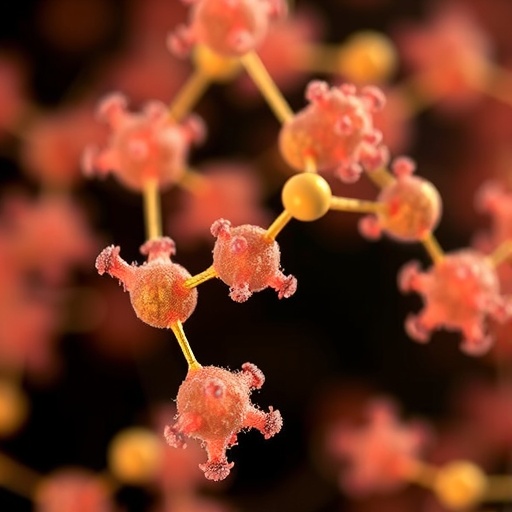In a groundbreaking study revolving the field of nanotechnology and medicine, researchers have illuminated the potential of curcumin-loaded chitosan nanoparticles in combatting liver fibrosis. This innovative approach is poised to redefine therapeutic strategies against hepatic conditions that have long baffled the medical community. Liver fibrosis, characterized by an excessive accumulation of extracellular matrix proteins, is a critical phase in the progression of liver diseases that can ultimately lead to cirrhosis and liver failure. The significance of early intervention and effective treatment modalities cannot be overstated, as it can dramatically improve patient outcomes.
Curcumin, a bioactive component derived from the turmeric plant, has been historically celebrated for its myriad of health benefits, particularly its anti-inflammatory and antioxidant properties. However, curcumin’s bioavailability—a measure of how much and how efficiently the compound is absorbed into the bloodstream—has posed challenges in its clinical applications. Researchers have grappled with these limitations, searching for formulatory advancements that can enhance the delivery and effectiveness of curcumin in human health.
In their pursuit of a solution, Hasanzade and colleagues embarked on an insightful exploration of chitosan nanoparticles. Chitosan, a biopolymer derived from chitin, exhibits remarkable biocompatibility, biodegradability, and non-toxicity. The combination of curcumin with chitosan nanoparticles not only promises to enhance bioavailability but also provides a targeted delivery mechanism that ensures the therapeutic agent reaches its intended site of action within the liver. This novel formulation holds the potential to facilitate better uptake of curcumin, ultimately maximizing its therapeutic efficacy in treating liver fibrosis.
The methodology deployed by the researchers involved the meticulous fabrication of chitosan nanoparticles, ensuring optimal characteristics for drug delivery. By varying the formulation parameters, they achieved uniformity in particle size, surface charge, and drug loading capacities, critical for maximizing the therapeutic outcomes. Advanced characterization techniques were employed to analyze the physical and chemical properties of the nanoparticles, a vital step in confirming their suitability for clinical application.
In vitro studies demonstrated the effectiveness of these nanoparticles in preventing the progression of liver fibrosis. The findings indicated that curcumin-loaded chitosan nanoparticles significantly reduced levels of pro-inflammatory cytokines and markers associated with fibrosis, thereby showcasing their reparative capabilities on liver cells. The cellular pathways involved illustrated curcumin’s role in modulating fibrogenesis, which could pave the way for future research into similar therapeutic agents. It is through such mechanistic insights that the study not only elucidates the benefits of curcumin but also sets the groundwork for further investigations into targeted nanomedicines.
The pharmacokinetics of the formulated nanoparticles revealed promising results as well, indicating prolonged circulation times and enhanced accumulation in liver tissues. These characteristics address the limitations associated with conventional curcumin administration, which often falls short owing to rapid metabolism and clearance from the body. By leveraging nanoparticles, the research team effectively tackled a longstanding hurdle in harnessing the medicinal properties of curcumin.
The implications of this research extend beyond academic curiosity; they resonate with clinical relevance and real-life applications. Liver diseases remain a substantial global health burden, and the search for novel and effective interventions has never been more urgent. This study could catalyze a shift in clinical practice, encouraging healthcare professionals to consider nanoparticle formulations as promising avenues in managing and preventing chronic liver conditions.
Moreover, the approach demonstrated in this research raises fascinating questions about the future of pharmacotherapy. The adaptability of nanoparticle technology could lead to the enhancement of other naturally occurring compounds, creating a new paradigm where traditional remedies are revitalized through modern engineering and scientific understanding. This methodology heralds a new era in which the adjunctive use of nanotechnology can potentially reinvigorate the therapeutic landscapes of numerous chronic ailments beyond liver fibrosis.
By highlighting the intricate interplay between nanotechnology and medicine, this study underscores the significance of interdisciplinary research. The collaboration among chemists, biologists, and pharmacologists exemplifies how diverse expertise can converge to tackle complex medical challenges and pave the way for innovative solutions that benefit patients worldwide.
The publication of these findings in a reputable journal such as BMC Pharmacology and Toxicology marks an important step in scientifically validating alternative treatment strategies that might otherwise be overlooked. The peer-reviewed nature of the research lends credibility to the results, encouraging further endeavors aimed at clinical translation and regulatory approval.
In conclusion, the marriage of curcumin with chitosan nanoparticles represents a formidable attack strategy against liver fibrosis. This study not only broadens our understanding but serves as an essential cornerstone for future research. The encouraging results open the door to a plethora of experimental avenues that could ultimately lead to new therapies advocating for liver health, signaling a beacon of hope for patients and healthcare providers alike. The medical community is undoubtedly watching closely as the ripples of this research continue to unfold.
Subject of Research: Curcumin-loaded chitosan nanoparticles for liver fibrosis prevention.
Article Title: Curcumin-loaded chitosan nanoparticles: a promising approach to liver fibrosis prevention.
Article References:
Hasanzade, P., Mosayebi, G., Ganji, A. et al. Curcumin-loaded chitosan nanoparticles: a promising approach to liver fibrosis prevention.
BMC Pharmacol Toxicol 26, 190 (2025). https://doi.org/10.1186/s40360-025-01031-w
Image Credits: AI Generated
DOI: https://doi.org/10.1186/s40360-025-01031-w
Keywords: Curcumin, chitosan nanoparticles, liver fibrosis, nanotechnology, drug delivery, bioavailability, therapeutic efficacy.




